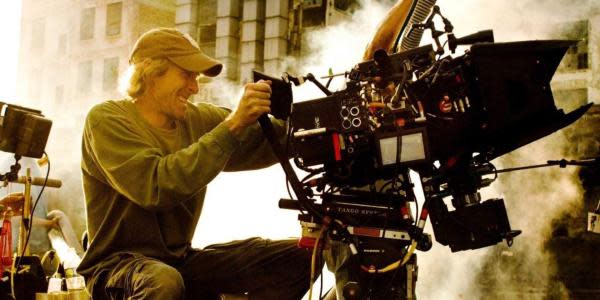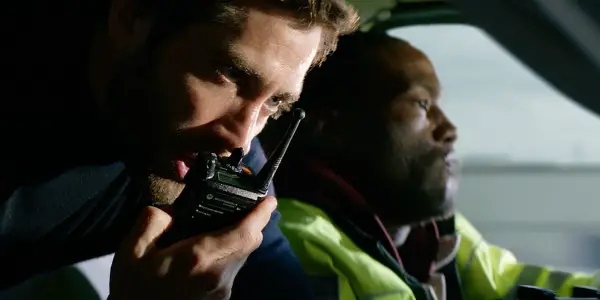AMBULANCE: An Angry Auteur With Restraint (Or How Michael Bay Learns To Love People)

John Bizub is a 20-year-old film student at Fairfield University…
Throughout Michael Bay‘s latest outing, Ambulance, there is a scene where our protagonist, played by Yahya Abdul Mateen II calls his wife and lies about the work he has done. While not discussing what has occurred in his day, his wife feels proud of him, like he has a purpose in this world as an ex-military man. The reason I mention this aspect of the film is the breath of fresh air for humanistic care of people in a Michael Bay film in 2022. For those unaware, Bay‘s psychological thinking boils down to making movies to satisfy himself, not an audience. He frames his thinking within filmmaking like a maximalist with an almost narcissistic persona. An example of this thinking is, during a recent interview about Ambulance, Bay discussed the effects in the film, saying:
“That’s all live, real, ratchets. It looks very dangerous [and] it could be very dangerous if you don’t know what the hell you’re doing. Most of it is real stunts. There are very few blue screenshots in the movie. There’s not a lot of CGI. Some of the CGI is shit in this movie. There are a couple of shots that I wasn’t happy with, okay? Alright.”
He’s confessing his mistakes but also gloats about them in a stand-off-ish manner, which is why he is a fascinating filmmaker to study. Michael Bay‘s time for bandwagoning of hatred should come to a stop because of his ambitions, especially regarding his latest outing, Ambulance, and its sense of heart and humanity within an unhinged filmmaker’s mind.
Background of a Nihilist
While starting out making commercials and music videos in the 1990s, Bay‘s first film, Bad Boys, feels like a simple buddy cop action movie. The film stars Martin Lawrence and Will Smith as two Miami PD cops investigating a mysterious steal of heroin from their headquarters evidence. The two central leads carry comedic performances and must stop an unstoppable villain in order to save the day. Bad Boys cements Bay‘s trademarks head-on: the sunset car driving, intense camera movement, the rotational close-up camera work. The story is fairly simple but is elevated by Bay‘s maximalist expressionism with big explosions all told with a bombastic spectacle eye.

After the success of Bad Boys with a low budget, Bay tackles a bigger budget with an even bigger cast in The Rock. Actors like Sean Connery, Nicholas Cage, Ed Harris, and Michael Biehn all-star in this ode to the decade of action blockbusters. The film is important for Michael Bay‘s filmography as the themes it provokes will later be a staple throughout Bay‘s work. His love for the military and his hatred of the government.
If you are a resident Michael Bay enthusiast or new to his work, his politics are very different within each film. At times angling from a conservative patriot perspective and sometimes from a leftist libertarian, however, I digress.
Getting back to The Rock, these themes feel apparent but is also one of the last films from Bay‘s filmography where he cares about the lives of the people. There are scenes throughout The Rock that allow chemistry to transpire between the two leads while also establishing rudimentary goals and ambitions Also shown in Pearl Harbor, Michael Bay fully embraces his narcissistic-like tendencies in his films while also not afraid to show our protagonists engaging in relationships and friendships with others. Again, Michael Bay could not care about what his audience thinks of his movies but his own self-satisfaction. His 2003 film, Bad Boys II, is full of offensive and crude humor but is done by a man who feels at home with the unhinged and deranged. Gone is the backdrop of simpler things, and in return, audiences are served with selfish and nihilistic filmmaking. There is even a sequence where both Lawrence and Smith make fun of Lawrence‘s daughter’s date, to his face.
In regards to action sequences, Bay shoots action sequences practically, every explosion feels like a visual punch. Meaning that every destruction of the public property feels expensive, visceral, and at the moment. This feels complimented by tough-as-nails sound design and fascination with how much mayhem can be overloaded on screen. They feel frantic, and incomprehensible but also expensive and feel like within every new action Michael Bay film, he improves his craft.

While Michael Bay would try to make his Transformers franchise a humanist story, the human characters mainly drive the film forward in terms of story structure and Bay allows the robots to do the heavy lifting in terms of characterization. Bay understands what those movies are made for and serves that demographic while also pleasing himself by producing bombastic, over-the-top, and larger-scaled blockbusters. When actor Hugo Weaving called Megatron to be “meaningless”, Bay fired back with: “Do you ever get sick of actors that make $15 million a picture, or even $200,000 for voiceover work that took a brisk one hour and 43 minutes to complete, and then complain about their jobs? With all the problems facing our world today, do these grumbling thespians really think people reading the news actually care about trivial complaints that their job wasn’t “artistic enough” or “fulfilling enough”? I guess The Hollywood Reporter thinks so.
“What happened to people who had integrity, who did a job, got paid for their hard work, and just smiled afterward? Be happy you even have a job – let alone a job that pays you more than 98% of the people in America. I have a wonderful idea for all those whiners: They can give their ‘unhappy job money’ to a wonderful Elephant Rescue. It’s the David Sheldrick Wildlife Trust in Africa. I will match the funds they donate.” Michael Bay feels so strongly about his films whether he likes them or not and sometimes reacts in a way in which the demographic these films are made for. Say what you will about the film series’ effects, but Bay creates an authenticity to the time the movies were made in and a visual treat for the robots, seeing the parts fly on-screen as a tower is being smashed brings me so much excitement.
I mean hell, the Transformers movies feel authentic within the confines of that decade because what other action franchise would end with the leading hero giving a monologue about peace while a Breaking Benjamin song plays through the background.

With Bay‘s films Pain & Gain and 13 Hours: The Secret Soldier of Benghazi, he creates both an anti-biopic and a spectacle for his filmmaking form. With Pain & Gain, while he does care for the subjects, he creates them out to be some of the meanest men on the planet and tells a story with nihilism and colored-ooze. With 13 Hours, Bay experiments with what action filmmaking can do with the camera, hence why Bay worked with fellow Michael Mann collaborator, Dion Beebe.
And with regards to 6 Underground, that feels like Michael Bay returning to his Bad Boys II era of action filmmaking, gone is the color, and it is the addition of immense destruction of property and unflinching violence.
Ambulance and Bay’s Attempt At Emotional Depth
And here we are with Ambulance, a very unexpected swing for Michael Bay within his experimental filmography. The film tells the story of two brothers, played by Jake Gyllenhaal and Yahya Abdul Mateen II, on the run in a non-stop moving ambulance with a shot cop and an EMT on board as hostages. Like Bay’s previous works, his attention to practical destruction is outstanding. Every car or object being destroyed or injured looks expensive.
Michael Bay’s visual eye feels akin to the likes of late-period Tony Scott, feeling hyperactive and intense. The two takeaways from Ambulance are the birth of Bay’s fascination with drone filmmaking and the beating heart that accompanies Ambulance throughout its 134-minute runtime. For long time Bay-heads, this could be jarring. Seeing a selfish filmmaker come to terms with human personal issues and focusing the story completely around one man fighting for his family feels like a welcome return to Bay’s The Rock-era.
Throughout the film, we see marine William Sharp (Mateen II) struggle to make ends meet in terms of insurance payments and hospital bills, he feels worthless as a man, like his time in the military meant nothing to provide for a family. Will even goes to ask his brother Danny (Gyllenhaal) for money and thus the story begins.

Michael Bay not only cares about our central protagonist, but also some of the side characters. Cam (played by Baby Driver’s Eiza González) is a head-strong EMT who does not seem to care about the people she rescues but does so within the film’s final moments. It is a harrowing feat for Michael Bay, at times seemingly unrecognizable in terms of thematics. While he does poke fun at the antics within the police department, his jingoistic perspective is completely stripped, minus one sequence dedicated to the American flag and Sharp being a military man.
Instead of acting like a bruting and doomed human being, Bay has a sense of humanity. This could be due to the film starting production during the confines of the ongoing COVID-19 pandemic and the struggle for loving yourself and others while being confined in our homes.
The Next Stage For Bayhem
While it is unclear about the next project Michael Bay will direct, I think Bay will return to his selfish and nihilistic roots shown in 6 Underground. Given the world events, Bay could create a new type of action filmmaking shown within the drone cinematography in Ambulance or go back to his edgy and franticly colored-ooze like in Pain & Gain. Whatever story Bay tackles next, we should not prepare or anticipate certain thematics because, after Ambulance, there seems to be a humanist and caring side to him.
What do you think? Let us know in the comments below!
Does content like this matter to you?
Become a Member and support film journalism. Unlock access to all of Film Inquiry`s great articles. Join a community of like-minded readers who are passionate about cinema - get access to our private members Network, give back to independent filmmakers, and more.
John Bizub is a 20-year-old film student at Fairfield University and has loved film for their entire life! When John is not watching and reviewing movies, they are listening to music, another passion for them, as well as playing video games!













